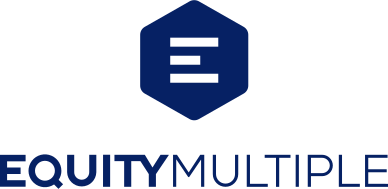EquityMultiple Review 2024: Pros, Cons and How It Compares
Many, or all, of the products featured on this page are from our advertising partners who compensate us when you take certain actions on our website or click to take an action on their website. However, this does not influence our evaluations. Our opinions are our own. Here is a list of our partners and here's how we make money.
The investing information provided on this page is for educational purposes only. NerdWallet, Inc. does not offer advisory or brokerage services, nor does it recommend or advise investors to buy or sell particular stocks, securities or other investments.
Our Take
4.2
The bottom line:

on EquityMultiple's website
Pros & Cons
Pros
Access to commercial real estate investments.
Easy-to-use website.
Liquidity options for certain investments.
Cons
Only open to accredited investors.
Complex fee structures that vary by investment.
Compare to Similar Brokers
Current Product
NerdWallet rating 4.2 /5 | NerdWallet rating 4.6 /5 | NerdWallet rating 4.9 /5 |
Fees 0.5% - 1.5% other fees apply | Fees 0% - 2.5% management fees; other fees apply. | Fees 1% to 1.25% management fees; other fees may apply |
Account minimum $5,000 | Account minimum $10,000 | Account minimum $5,000 |
Promotion Earn a special 1% return boost on your first investment | Promotion None no promotion available at this time | Promotion None no promotion available at this time |
Learn more on EquityMultiple's website | Learn more on Yieldstreet's website | Learn more on RealtyMogul's website |
Get more smart money moves — straight to your inbox
Become a NerdWallet member, and we’ll send you tailored articles we think you’ll love.
Full Review
EquityMultiple is an online real estate company that allows accredited investors to invest in professionally managed commercial real estate. Accredited investors can use EquityMultiple's online platform to access real estate investments in different markets. EquityMultiple offers equity, preferred equity and senior debt investments, as well as short-term notes.
EquityMultiple is best for:
Accredited investors looking to diversify through real estate.
Those who can comfortably invest $5,000 or more.
Individuals who want access to commercial real estate.
EquityMultiple at a glance
Investor requirements | Accredited investors only. |
Investment minimum | Minimums start at $5,000, but can vary by offering. A typical range is $10,000 to $30,000, with additional shares offered in increments of $5,000 above the minimum. |
Redemption options | Alpine Notes are relatively liquid. For Ascent Income Fund, redemption options are available after one year. For certain investments, investors may be able to sell shares in private transactions, but this is not guaranteed. |
Fees | Varies by investment but ranges from 0.5% to 1.5%. Funds may also charge an origination fee that is paid upfront. No fee for short-term notes. EquityMultiple also charges an administrative fee for all offerings, which ranges between $30 and $70 annually. |
Investment selection |
|
Website ease of use | This is our judgment of how easy it is to find critical information on the EquityMultiple website, including platform fees, account minimum and redemption options (if offered). |
Investment transparency | This is our judgement of how easy it is to find critical information about investment offerings, including investment fees, risks, risk mitigation efforts, the process for vetting investments and how investment returns are distributed to investors. |
Customer support options | Phone, live chat and email Monday through Friday, 9 a.m. to 6 p.m. Eastern. |
EquityMultiple features you should know
Accredited investors only: EquityMultiple may open up commercial real estate investments to individual investors, but those individuals need to be accredited. Accredited investors are defined as individuals with a net worth, or joint net worth with a spouse, of more than $1 million (excluding their home’s value), or an annual income of more than $200,000 ($300,000 with a spouse) in each of the past two years, with the expectation of maintaining that income going forward. Those with certain professional certificates or credentials may also qualify as accredited investors.
High investment minimum for most offerings: The minimum varies by project, and although it starts at $5,000, a $20,000 minimum is common. Additional shares are typically offered in increments of $5,000 above the minimum.
Specialized investments: EquityMultiple offers preferred equity, common equity, funds, short-term notes and senior debt. The company provides access to these products through three main offerings:
The Alpine Note offers flexible terms of three, six and nine months, with a minimum investment of $5,000. EquityMultiple considers the Alpine Note a cash management tool, as it offers the most liquidity on the platform.
The Ascent Income Fund aims to provide steady income by investing in senior real estate debt. Redemption options become available after one year, and the minimum was recently lowered to $5,000.
The Brooklyn Industrial NPL Acquisition is a commercial real estate investment focused on opportunistic equity. The investment minimum is $20,000, and the target holding period is five years.
Note: Many of these types of investments are complicated and should not be entered into lightly. It’s always a good idea to talk with a financial advisor before adding a new asset to your portfolio.
High returns: The targeted rates of return are fairly high, and depend on the type of investment. EquityMultiple publishes these target rates. As of this review, rates were:
Alpine Note: 7.4% annualized yield.
Ascent Income Fund: Target returns of 8% to 12% for senior debt and 10% to 14% for preferred equity.
Brooklyn Industrial NPL Acquisition: Target net internal rate of return of 18%.
Of course, actual returns will vary from target returns and there is no guarantee that your investment will earn a return at all.
Typically debt and preferred equity investments give investors distributions either monthly or quarterly, though EquityMultiple stresses that each investment will differ, and it says to refer to specific investment documents to know each investment’s distribution timeline.
Keep in mind that these assets can be illiquid, so if you think you may need your money before the timeframe is up, it may be best to consider other investment options.
Easy-to-use platform: Accredited investors start by creating an account. After receiving an email confirmation, you can register (which includes self-certifying that you are, in fact, accredited — though you won’t need to provide documentary evidence of this) and immediately start reviewing the investment offerings. Signing up for an account doesn’t require making a deposit, but if you decide to invest, you can link the funding source online.
Complex fees: Most investments on EquityMultiple charge an annual fee between 0.5% and 1.5%.
Because each investment listed on EquityMultiple’s platform is unique, each investment has its own fee structure. Some may include additional fees, including origination fees and an annual administration fee that can range from $30 to $70. To know exactly how much you can expect to pay in fees for each investment, read the specific disclosure and registration statements. If you don’t understand the fee information, contact one of EquityMultiple’s representatives.
Strong customer support: Many of EquityMultiple's peers only offer an email address or ticketing system to field customer questions. EquityMultiple offers email, chat and phone, available to prospective and existing clients.
» Compare before investing: Best real estate crowdfunding platforms
Is EquityMultiple right for you?
EquityMultiple’s unique set of investment opportunities gives accredited investors an easy way to diversify the real estate within their portfolio.
If you’re interested in allocating a small portion of your overall portfolio to real estate, and can do so while meeting EquityMultiple’s investment minimums, you might find a good fit in the platform.
However, it is important to note that some of EquityMultiple's investments are illiquid — meaning you won’t be able to get your investment back immediately, or in some cases for several years. Investing in real estate this way is a long-term game, and if you’re not prepared to wait it out, you may want to consider more liquid assets, such as publicly traded REITs.
» Curious about other options? Check out our guide on how to invest in real estate
How do we review real estate platforms?
NerdWallet’s comprehensive review process evaluates and ranks companies that allow U.S. customers to invest in real estate, primarily through non-traded REITs or private equity. Our aim is to provide an independent assessment of providers to help arm you with information to make sound, informed judgements on which ones will best meet your needs. We adhere to strict guidelines for editorial integrity.
We collect data directly from providers through detailed questionnaires, and conduct first-hand testing and observation through provider demonstrations. The questionnaire answers, combined with demonstrations, interviews of personnel at the providers and our specialists’ hands-on research, fuel our proprietary assessment process that scores each provider’s performance across eight factors. The final output produces star ratings from poor (one star) to excellent (five stars).
For more details about the categories considered when rating brokers and our process, read our full methodology.
on EquityMultiple's website



